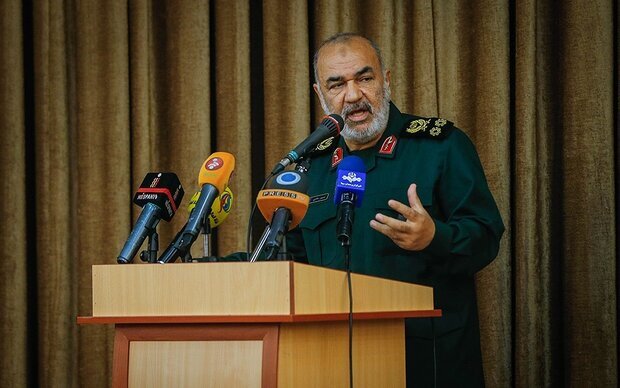Foreign presence in Persian Gulf detrimental to regional security: IRGC chief

TEHRAN – Chief of the Islamic Revolution Guards Corps (IRGC) says Iran regards the presence of outsiders in the Persian Gulf as detrimental to the security of the region.
“The enemies are not capable of reaching their goals and with their presence in the Persian Gulf and other regions, they are merely intensifying tensions,” Major General Hossein Salami said on Thursday, Mehr reported.
General Salami said the wars waged by the enemies in the region have been fruitless.
He also said no country can establish security in the entire region as good as Iran can.
The United States has announced plans to form a coalition to supposedly protect shipping in the Strait of Hormuz following a series of mysterious attacks on oil tankers in the strait and the Sea of Oman.
Washington has accused Iran of having a hand in those attacks without presenting a shred of evidence. Iran has strongly rejected the claim. Tehran has warned that such acts of sabotage may be part of a general ploy to target Iran amid increasing regional tensions.
The U.S. has asked its allies to join the coalition, a call which has not been warmly received by several countries, including Germany, Japan and Spain, over apparent fears that such a mission could further ratchet up tensions with Iran.
“No country or coalition of countries would be able to maintain security in this region expect the littoral states of the Persian Gulf,” General Salami remarked.
“We believe in a regional security system with participation of the Persian Gulf countries,” he added.
Elsewhere in his remarks, Salami said unlike what the enemies intended, the sanctions have helped the Islamic Republic to reach its economic and political independence.
“Sanctions cannot stop our progress,” he said, adding that if there were no sanctions, Iran would not achieve its economic and political independence.
The U.S. has ratcheted up pressure on Iran since last year after withdrawing from the 2015 nuclear deal, also known as the Joint Comprehensive Plan of Action (JCPOA).
Since then, the administration of U.S. President Donald Trump has been trying to reduce Iran’s oil exports to “zero,” and has sent an aircraft carrier strike group, a bomber squad, an amphibious assault ship, and a Patriot missile battery to the Middle East to try to stack up pressure on Tehran.
At the same time, Trump has called for talks with Tehran.
Commenting on the anti-Iran policies adopted by the Trump administration, Iran’s Parliament Speaker Ali Larijani said recently that unlike Trump, his predecessor Barack Obama was a “wise enemy”.
“During the previous administration, the U.S. offered talks to Iran and Iran accepted … because our initial impression was that Mr. Obama was following some principles in his policies,” Larijani said in an interview with the NBC’s Lester Holt in Tehran, referring to the nuclear talks under the Obama administration that led to the JCPOA.
“He was our enemy, but he was the wise enemy. It’s easier to interact with a wise enemy,” he said.
MH/PA
Leave a Comment